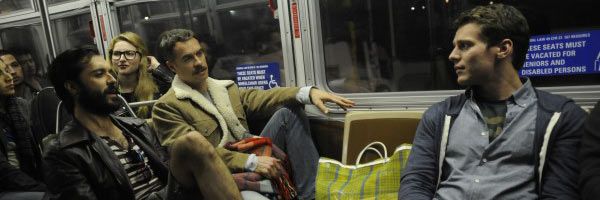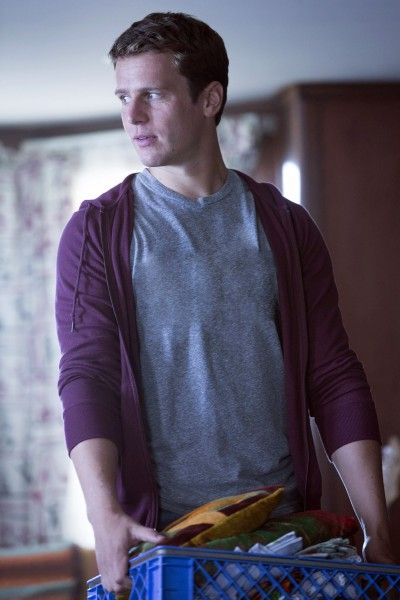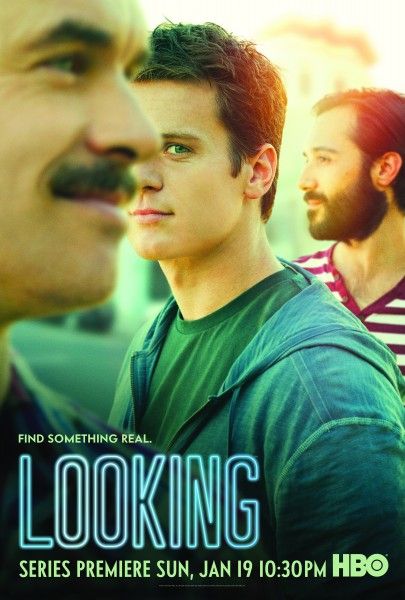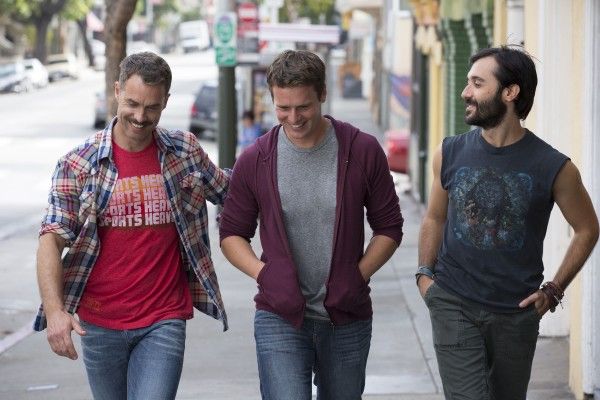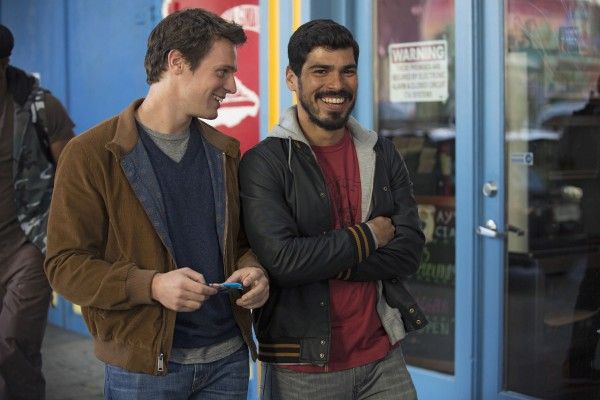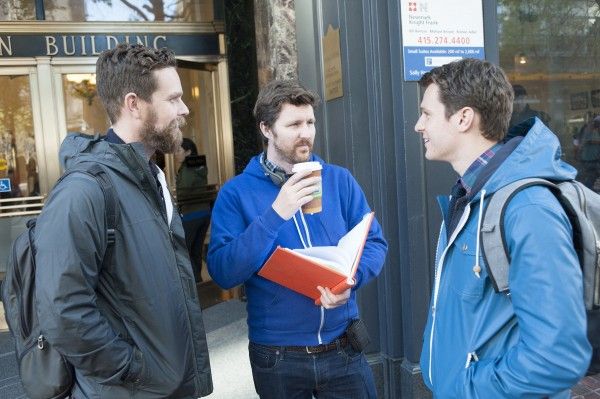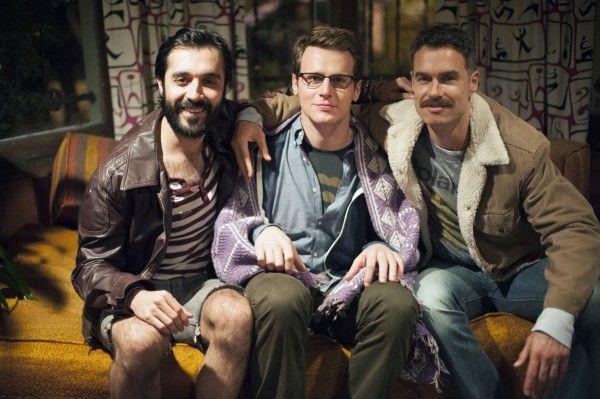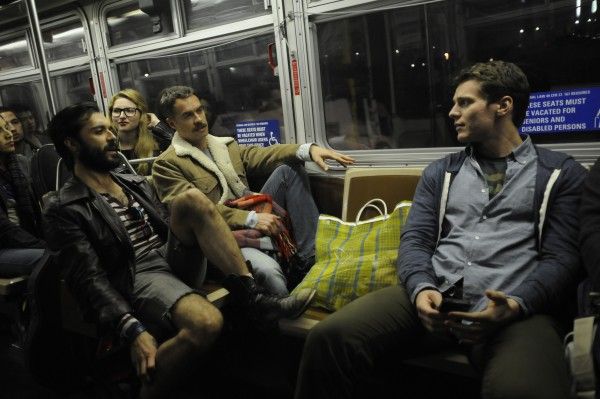The HBO series Looking tells the story of three friends, Patrick (Jonathan Groff), Agustín (Frankie J. Alvarez) and Dom (Murray Barlett), who live, work and love in the city of San Francisco. They explore the exciting and varied options available to a new generation of gay men, in a frank, honest, hilarious and tragic way.
During this recent exclusive interview with Collider, actor Jonathan Groff talked about what attracted him to Looking, how quickly he clicked with his co-stars, getting to explore the quiet moments, how much fun it was to shoot at the Folsom Street Fair, how he had to learn to be in the moment on set, and whether his character will get his life together this season, or if that will be an ongoing journey. He also talked about the huge success of Frozen, in which he voiced the character of Kristoff, and why working on it was a childhood dream come true, as well as what being a part of The Normal Heart meant to him. Check out what he had to say after the jump.
Collider: First of all, congratulations on the huge success of Frozen!
JONATHAN GROFF: Oh, thank you! I can’t believe it. I believe in the movie. It’s so incredible. But I don’t think anybody saw the level of success that it’s getting. When I first saw the movie, I was so blown away by the progressive message about the true love being between the sisters. Girls and boys grow up hearing, “You can’t marry someone you just met,” as opposed to, “One day my prince will come.” I love the way they made a classic Disney film by turning it on its head, at the same time, and making it contemporary. Now that so many people have seen it and it’s reached such a wide audience it makes me even more proud of all the messages in that movie. It’s really reaching so many young people, all across the world. People from my hometown sent me messages to tell me that they had seen it. I think it speaks to that thing where, when you let the creative people tell the story that they want to tell, and Jennifer Lee said, “I want to make a movie that my daughter can watch,” and then it has success, you’re like, “Oh, man, that’s great!”
Have you already told them that, if there’s a sequel, your one requirement is that you have to be able to do more singing?
GROFF: I haven’t told them that! They kept apologizing to me. Bobby [Lopez] and Kristen [Anderson-Lopez], and Chris [Buck] and Jen [Lee] were like, “We’re trying to figure out where we can write a song for you. We want to do another song.” And I was like, “Look, I’m a character in a Disney movie and I’m singing for 15 seconds. I could not be happier. This is every childhood dream come true. I’m good.”
How did Looking come about?
GROFF: I got the script and read it, I knew it was HBO, and I knew it was going to shoot in San Francisco, which was also cool. But the major elements where I was like, “I have to get in the room and audition for this and fight for this was the attachment of Andrew Haigh, who is our director and our executive producer, and he was in the writers’ room for the first season. I had seen his movie Weekend in the movie theaters in New York, when it came out two or three years ago, and I was blown away by it. I was blown away by the way he dealt with sex and the gay experience. I just loved that movie. When I knew that he was directing this show, I was like, “I want to meet that guy. I want to audition for this. I think he’s really a special, creative genius.”
Had you just been given one script, or was the season already written?
GROFF: It was just one script that had been written. Some of the scenes, like when I’m on the awkward date, and then when I meet Richie (Raúl Castillo) on the train, were exactly the same as they were written, but it evolved, as well, as people got cast. We had two weeks in San Francisco, before we started shooting, to soak up the city and have some rehearsals. We did a bunch of improvs to get into our characters and to get to know each other, so the script evolved from there. Even when we continued to get scripts for the show, Andrew is very not previous about the writing. Sometimes we’d do things completely as written, and other times we’d improv into or out of a scene. It’s a very collaborative relationship between the writers, the actors and the directors, and even our costume designer and our cinematographer. It’s like a living, breathing organism, to capture those real naturalistic moments. I would memorize my lines the night before, and then wake up in the morning with no plans for how I was going to act it because when you got there, it was never what you expected it to be. And Andrew wasn’t looking for pre-planned performances. He really was trying to see people actually talking to each other. So, you’d get there on the day and it would be the energy that you bring, and bouncing off your fellow actor, and then the writers coming in and changing stuff. I’ve never worked on something that was so in the moment before. It was cool. And I think part of what makes this show special is that it does have that feeling.
The three of you guys have such a natural friendship, on screen. Did you instantly click with your co-stars?
GROFF: That was a kismet, lucky thing between Frankie [Alvarez], who plays Agustín, Murray [Barlett], who plays Dom, and I. From the minute we met at the screen test, we just started vibing, which I think read in the audition. Maybe that’s why the three of us got cast together. And I think it reads in the season, too. Even when we would finish work, we would hang out. After we do a whole day of press, we’ll go to dinner together. There’s a genuine affection between the three of us that you can’t really fake. When you see people together on TV, it would be hard to fake those relationships. We’re supposed to know each other for so long and there’s supposed to be so much history there, so the fact that the three of us vibed so well from the beginning was probably partly what got us the job, but a lucky thing, too, because you don’t always have that. I remember, in the beginning, people were nervous about the fact that I was friends with Murray’s character, Dom, because my character is 29 and he’s about to turn 40. People were saying, “Is this realistic that someone with such an age difference would be so close?” And I have friendships with people over 40. Some of my closest friends are that age. So, I think it’s cool that they honored that. Those relationships do exist. They didn’t try to put things in a box. And the characters are based on our creator Michael Lannan’s relationships and experiences, so they’re true to him, as well. It’s good that they’re coming off that way in the show.
When you do a show like this, that’s about the gay community, people like to make it seem as though it’s representing an entire community and not just this one group of people. Was it important to you that, if you were going to do this show, it is more grounded and doesn’t try to be over-exaggerated, and was it nice to be able to also explore the quiet moments?
GROFF: Yeah, for sure. The show is based on Michael’s friends from San Francisco. They even put up the pictures of his friends when they were casting it. It’s very much his experience. We knew that was the story we were telling. And then, as far as the sensibility is concerned, with the quiet moments, I knew Andrew Haigh’s involvement would bring that. That is why I was so drawn to it. I love his sensibility, as an artist. I admire him, so much. I knew that he would bring that energy to the show, and I thought that that would be a really cool thing to be a part of. It’s a credit to HBO to let people live in a moment and not constantly be pushing story, or be pushing salacious sex, or to be pushing the things that seem very attractive or eye-catching to an audience. This is a much quieter story about people just living their lives in San Francisco.
Did you think about the fact that being a part of a show like this could turn you into a spokesperson or a poster boy for the gay community, or is that something you’re totally comfortable with?
GROFF: I don’t think about that. I’ve always felt like just an actor. I didn’t think about that, at all, signing on to it. Andrew, the writing, HBO and the city were the things that made me want to sign up for it. I feel like I’m an actor playing a role in a show. If that show somehow makes young people who are gay feel more comfortable with themselves, and as being one of the actors who’s the face of that show, if that’s representative to them, then that’s awesome. But, I don’t really think about that when I’m acting, or in my every day life, in any way. I do feel proud to be gay and know that we’re doing a show on TV with a bunch of central characters that are gay. That’s such a cool step forward. And the characters on the show aren’t grappling with their sexuality. They aren’t freaked out by the fact that they’re gay, and they’re not coming out and anxious about it. The issues in this show, between the characters, are about their work, their love life, and their relationships and friendships. The gay thing is an element of who they are, but it doesn’t define who they are. I’m excited to be a part of that. Outside of that, as just a gay person in the world, it’s cool that there’s a show like that on TV, but I don’t feel symbolically representative of that movement or that world. I just feel like an actor on a show.
How much fun was it to shoot the big crowd scene at the Folsom Street Fair?
GROFF: Ryan Fleck was our first guest director, and he director Episode 4. Andrew directed the first three episodes. That was his first day as director, and we were like, “This poor man has to come in and direct his first episode in the middle of the Folsom Street Fair.” He was amazing, and he got amazing stuff. Part of what made him amazing, and he set the tone that day, was that we just had to roll with it. He was like, “If we get it, we get it. If we don’t get it, we’re not going to try too hard. We’re going to move on.” But, they ended up getting everything they wanted and making the day. I think part of the reason that we were the least interesting thing happening at the Folsom Street Fair. There is so much extreme antics happening. We were in a crowd and they were watching someone being hung on meat hooks. They didn’t care that someone was holding a camera, recording a walk-and-talk. They didn’t even notice us. For that scene where I meet up with them and we hug in the middle of the crowd, our cinematographer was on a ladder in a sea of hundreds of people, and no one even looked at the camera. It was just like, anything goes. A lot of the series felt like that because there was such a desire to capture real moments. That was an extreme version of being in an uncontrollable crowd situation, but everything felt uncontrollable.
Did improvised scenes happen a lot?
GROFF: You really had to give over to the moment, on this show. You couldn’t pre-plan anything, whether it was because of the extras or because of the location we were on. Because of the nature of this show, you’ve just gotta be in the moment, which I think pushed me, as an actor, and pushed all of us to really listen to each other and grow with each other. When you see the last four episodes, the evolution of their relationships and the way that we work with each other deepens and grows. We start to form these really deep, trusting relationships with each other. It’s scary to come to work and not know what’s going to happen, and that’s how it was, every single day. Even when we would shoot scenes in my apartment, I would never know if I was going to say what was written, or if it was going to be something new, or if Raúl, who plays Richie was going to come in with an idea that would change everything, in the moment. It was very unexpected, and that’s the environment that Andrew set up.
In the end of Episode 2, when I’m eating macaroni and cheese on the phone with Agustín, in a lot of TV and movies, you would have a person from the crew reading the other lines and you would react to them. That’s how it’s normally done. The other actor is off or has a costume fitting, or whatever. But Andrew was like, “We need to have Frankie there to read with Jonathan on the phone, to see what might happen.” At the end of the scene, it happened on one take and became the button of the episode, Frankie, out of the blue, said, “It sounds weird. Are you eating something?” And I lied and said, “I’m eating a kale salad with chicken.” That was an improv that came out of the fact that Andrew insisted that Frankie was on the phone, and the two of us were genuinely connecting with each other. That’s such a testament to the way that we work there.
Not only is Patrick having trouble figuring out his love life, his work life seems to also be falling apart a bit.
GROFF: Yeah, he’s going through a total crisis, in a good way. It provides a lot of comedy, which is great. Someone in that place of stepping outside of their comfort zone can be funny, and it’s also dramatically interesting, too. He’s getting to know himself better, as a person.
What was it like to work with Russell Tovey?
GROFF: He’s so great. I love him. He’s awesome. It was a blast. It was the same thing with Raúl, who plays Richie. All three of us come from the world of theater. Russell has done a bunch of plays in London, and did The History Boys on Broadway. Raúl is part of a theater company in New York, and also was a playwright. When you’re working with theater animals, there’s a language and an understanding of backstory and character that’s innate. There’s also a sense of improv and adventure that usually happens with theater actors. They’re willing to go for it. And there’s also a sense of audience with theater actors. They have a sense of what’s funny and what works. So, getting to work with both Russell and Raúl in such an intimate way was great, for many reasons, but a lot of which had to do with having a similar way of working. And those scenes are so interesting. The relationship dynamics with each of them is so different that it’s interesting to see Patrick’s connection with and attraction to two very different people. You can see why he would be attracted to Kevin, his boss, and you can also see why he’s attracted to Richie, but they’re very different. It’s also a reflection of Patrick’s inability to know where he’s at, who he is and what he wants. I think it’s good for Patrick. I don’t think he needs an easy life, right now. He’s got a lot of stuff to learn. It’s like, “Get your shit together, man. Come on!”
Will he get it together, at all, by the end of this season, or is that an ongoing journey?
GROFF: I think maybe it’s an ongoing journey. I think it always will be. Personally, for me in my life, I think every journey should be an ongoing journey, for anyone. The fact that Patrick is really starting to look at his life, for the first time, is a great message to send out to everyone. To say, “Who am I? What do I want? What is this relationship about? What am I after? Am I challenging myself at work? Am I showing my best side of myself to people I go on dates with? Why do I keep going on bad dates?,” and to really become introspective in that way and ask yourself about your life is so important. And I think it’s important to never stop asking those questions. He definitely learns a lot about himself. It’s not like he ends in the same place that he begins. But, there’s still a lot left to go, by the end of this season.
What was it like to also get to do The Normal Heart and work with Ryan Murphy, in that capacity, especially after having worked with him before?
GROFF: It was cool. Loyalty is not the most common quality in people, in this business, and he’s so loyal to not only his actors, which he uses again and again, but also his crew members. I’ve worked on three projects with him, and I’ve had the same make-up woman on each of the projects. He really stays loyal. His people are his people. That is just personally great. But then, professionally, there is a shorthand that happens and a level of being able to take changes and be really comfortable. I was so honored that he even asked me to be a part of that project. That is maybe the most powerful piece of theater I’ve ever seen, and the fact that it’s going to be captured for people to see it outside of the theater, in a major, mass way, is so meaningful.
What was it like to work with Mark Ruffalo?
GROFF: Oh, my god! I had a picture of Mark Ruffalo on my mirror, in my dressing room in the theater, and I fucking kissed him on the mouth. I didn’t tell him about that. I didn’t want to seem too creepy fan. But, he’s so nice. He’s the nicest guy. He would have been endeared, but I didn’t want to sell myself out too much. I had to work with the guy. He’s who I want to be. He’s so amazing. I think he would have been completely fine with it. I told Idina Menzel that I got her autograph at the stage door of Wicked, and she was okay with that. She’s great.
Looking airs on Sunday nights on HBO. The Normal Heart premieres on HBO in May.

